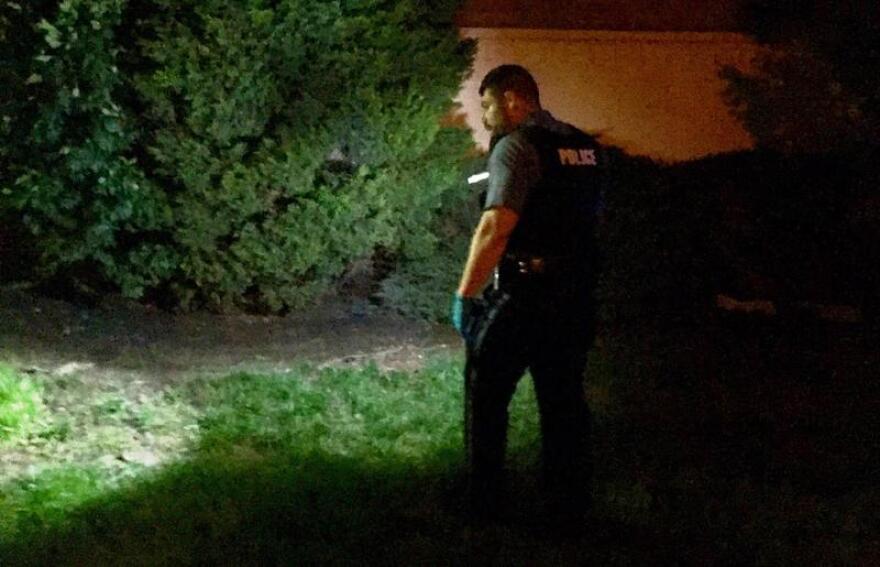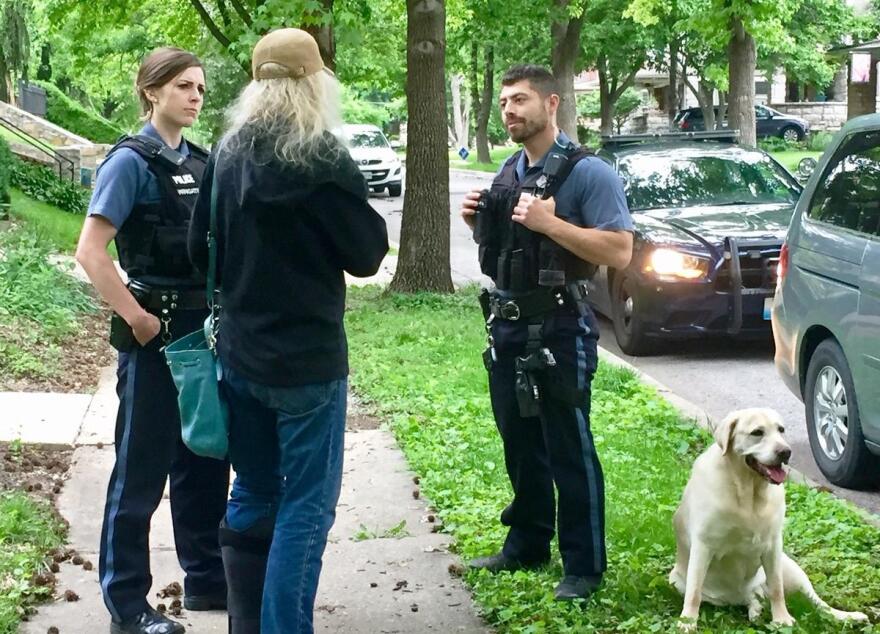It’s 4:30 on a Saturday afternoon, and officers Kelsey Wingate and Uriel Ojeda from the Kansas City Police Department's Central Patrol Division are already behind.
“We’re starting our shift with all these calls waiting for officer response," Ojeda says as he settles in behind the wheel and turns on the laptop.
Almost a dozen calls for service pop up. "That’s very common for us," says Wingate.
KCPD officers are busy. The number of homicides in Kansas City is up 9% over this time last year (57 versus 51) and approaching the pace of two years ago when there were 151 killings in the city.
Also, police commanders say, there have been 134 non-fatal shootings this year and drive-by shootings are on the same pace as last year.
All this has police and both candidates for mayor saying Kansas City needs more cops.
But how many?
“I don't know what that magic number is," says KCPD Chief Rick Smith.
There are 1,354 sworn members in the department. While Smith may not have a magic number, he does have a wish list.
“I know I'd like to have neighborhood officers for every sector in the city," says Smith. "That's about 38 more officers just to do kind of neighborhood policing, quality of life issues.”
After some more thought, Smith says 150 more officers would be good.
Violent crime isn’t curbed with just boots on the ground. Smith says he wants more detectives and a second shift at the crime lab.
Another hundred officers sounds right to Sgt. Brad Lemon, president of the Fraternal Order of Police lodge that represents KCPD.
“I also remember a time when we had for over 1,400 police officers on this job, and we did a spectacular job,” says Lemon.

In a rush
It is not that calls go unanswered or crimes are not responded to, but Lemon says cops must rush from job to job.
"I hear from officers all the time that they just don't have time to handle calls properly but they're getting pushed to answer as many calls as possible.”
That is certainly true for Ojeda and Wingate on a 4 p.m.-to-2 a.m. shift on a Saturday in April.
Their first stop is a possible domestic violence call at an apartment on Armour Boulevard. Then they move on to check on a woman in midtown, who appears to be off her medication.
A generation ago, this wouldn’t be a problem for the police to handle.
Now it is, and the department has added social workers. Smith says he’d like more.
“When we can't solve that in five minutes on a call and that family needs more help than we can provide or direction or whatever the case may be, that's where that social worker comes in and helps.”
Before the night is over, Wingate and Ojeda will do another medical check with paramedics, investigate a fight at the Negro Leagues Museum, check on a man who shot himself in the leg outside of his apartment and end up at a triple shooting inside an under 21 club near Westport.
All of this happened in the Central Patrol Division. Elsewhere in Kansas City on the same night, police responded to a sniper in an ally and were called to a serious car accident; also, an officer killed a suspect.
No formula
Some cities hire police based on population. Others on geographic size. Still others on calls for service. Which one is best?
“There is no one formula,” says Chuck Wexler, executive director of the Police Executive Research Forum, a Washington think tank.
Wexler says it all depends on what a city wants from police. Do people want community policing? A Police Athletic League? Mounted patrol? More detectives?
The KCPD has or wants all of those things.
Wexler says if citizens demand those services, it’s going to take more cops.
“But I will tell you this, more officers does not necessarily mean less crime. It's really about how you use them."
Kansas City has been wrestling with how to use the police going back decades. A city auditor’s report in 1998 said more officers were needed on patrol to alleviate so-called blackouts, when all officers were busy and nobody was available to take new calls. Another in 1998 suggested the city could save a million dollars a year by hiring civilians to do administrative jobs handled by officers.
That was echoed just two years ago in a report done by an outside consulting firm.
Smith says he would put some of his administrative officers on the street but questions how to pay the new civilians?
“The reason why we have some officers in administrative positions is because we don't get funding for those civilian positions,” he says.

Both candidates agree the city needs more officers
The Kansas City mayor has little direct influence on the police department. The city funds the police department, but a police commission, appointed by the governor, runs the department. The mayor automatically gets one of the six seats on the police board.
Neither Jolie Justus nor Quinton Lucas has a number of officers they would like to see on the KCPD, but both want more officers.
Lucas says he wants more officers in neighborhoods.
“I think we need more cops that are getting to know areas better, that are actually getting to spend time in given sectors and not just driving around the city all the time.”
Justus agrees and says she would like two more community officers in each police sector. That is at least 36 more officers. She also supports civilians replacing administrative officers.
“I would like to see more civilians doing the work that civilians are absolutely capable of doing. And those people that we invest the time and the money and the training in, our uniformed officers, I want to see them in the field doing the work that I'm talking about."
The answer to how many cops Kansas City needs is complicated, and how to pay for more officers likely is even more complicated.
Sam Zeff is KCUR's metro reporter. You can follow Sam on Twitter @samzeff.





